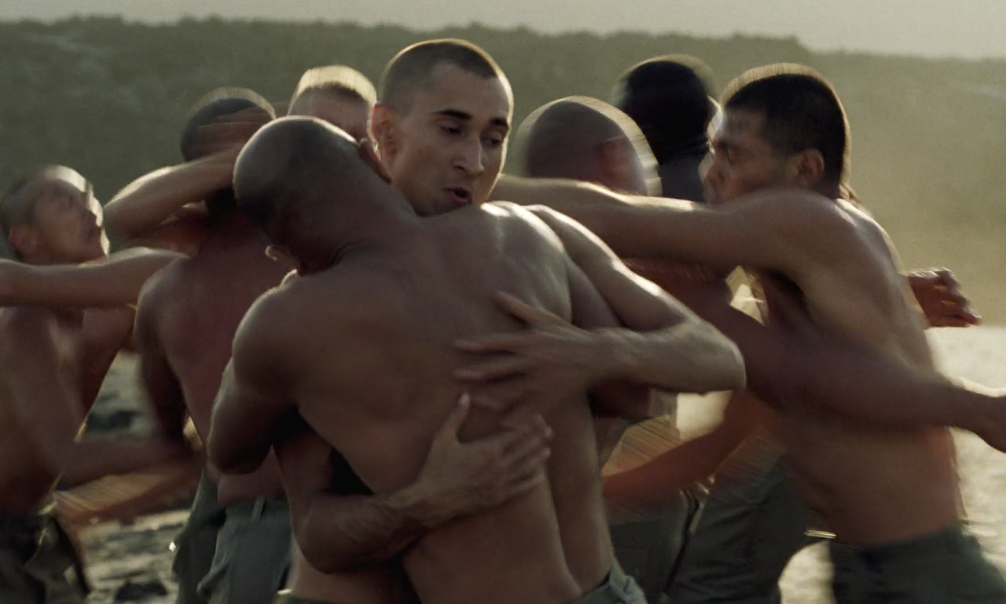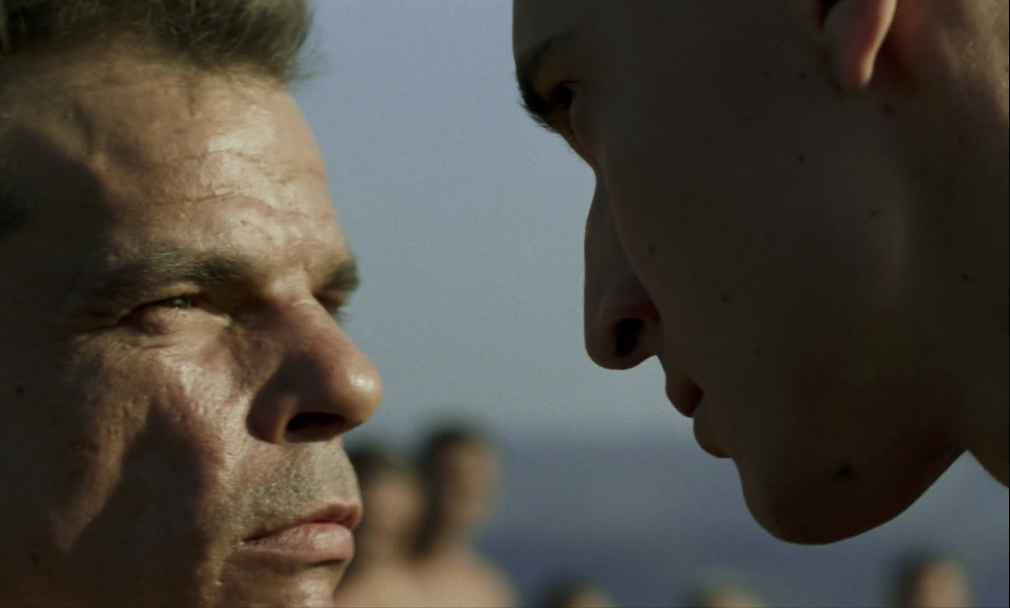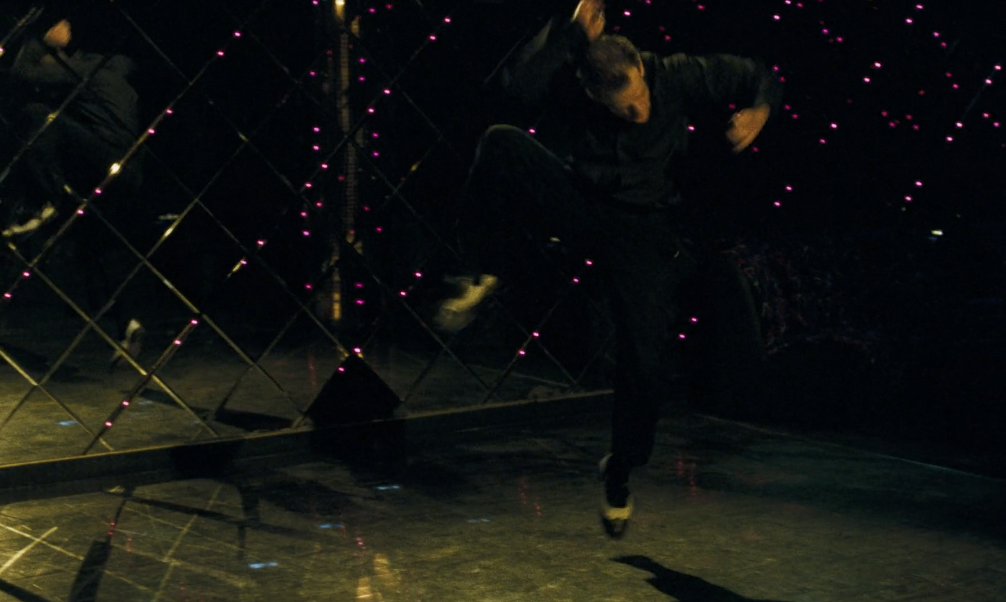| Ben Tuthill |

Beau Travail plays at the Trylon Cinema from Sunday, April 6th, through Tuesday, April 8th. For tickets, showtimes, and other series information, visit trylon.org.
The first time I watched Beau Travail, I cried for ten minutes straight. I watched it alone. I didn’t understand the plot very well. I knew that the final scene was famous, but when it happened I didn’t really get it. I started crying right about the moment the first credits hit and was a wreck until the Roku City took over my projector screen.
I cry a lot during movies. I cry fairly easily in general, usually for reasons that I don’t really understand. The most recent I cried was during Laura Dern’s robin monologue in Blue Velvet. The movie that most consistently makes me cry is Babe. I tear up when I think about certain things, like this scallop I had at a fancy sushi restaurant once. I think I cried when my grandpa died. I think I cried at my wedding. But I usually reserve tears for external experiences that have nothing to do with what’s happening inside of me. I think I’ve done a decent job of avoiding crying in public, and I know I’ve done an excellent job of severing the physiological response of crying from whatever emotional stimulus might be causing it.
I’ve long been unsure if I had the correct reaction to the end of Beau Travail. This is a stupid way to think about things, but having had an emotional response that in many ways felt detached from what I watched, I’ve never been certain my tears were tied to the film itself. Critical commentary discusses the wide array of narrative purposes that the final scene might serve, but it rarely goes deep into the viewer-response emotionalism of it. Simran Hans, in her write-up for Beau Travail’s place on the 2022 Sight & Sound list, gives a hint at what might be the official response to this film: “My face split into a grin of disbelief as the credits rolled and I rewound the final scene […] [it] is pure release: a wordless explanation after 90 minutes of tension.” Her write-up is insightful, but it describes pretty much the opposite of my reaction.
Feeling unsure as I sat down to write this essay, I decided to put the question of how this film makes you feel to Reddit and to critics who have gone on record loving it. At its heart, Beau Travail is a film about men having feelings, so surely there are some men out there who can describe the feelings they had while watching it.

On one end of the spectrum is British critic Geoff Andrew, who, remembering the UK premiere, told me: “My main response to the final scene was one of surprise and puzzlement […] I like the scene but don’t have the strong emotional response to it in the way you mention.” His appreciative coolness was reflected in many of the responses I got on Reddit. “I find it strangely comforting and uplifting,” wrote itkillik_lake. Yogkog reported that he thought the film was boring, but that when the final scene hit he found himself “silently giggling to myself and smiling.”
Others were more explosive. Many, like Hans, noted their elation. “I literally leapt out of my chair and clapped,” wrote Possible-Pudding6672, in the most explicitly celebratory review. “It took my breath away the first time I saw it,” wrote culturebarren. But some were more somber. Redditor ZeroTheCat wrote, in a much affirmed response: “I’ve been there before […] the main character of my own liberated fantasy […] I felt very lonely afterwards, probably because it stuck so true to that early queer experience many young men face with their masculinity and sexuality.”
New York Magazine critic Bilge Ebiri, recalling the New York premiere, wrote to me about a similarly ecstatic reaction, describing the scene as an “an overwhelming statement of humanity.” “It wasn’t just a release for the character and the actor, it was also a release for us,” he wrote. “The thing [Galoup] wants most is so basic, so simple, that it might be considered even tacky and vulgar. There’s something so overwhelmingly human and relatable about it. I’m getting emotional now just thinking about the scene.”
I’m struck in Ebiri’s recollection by his repeated use of the collective “we” and “us,” which might be rhetorical but nevertheless conveys the sense that the entire audience at that New York premiere was experiencing something together. It merges with the upvotes on all the Reddit responses, this sense that everyone who makes it to the end of this film accepts a collective invitation to suddenly feel whatever it is they need to feel, whether that’s standing up and cheering or crying or just letting the joy and the sorrow wash over them. There’s some community to it: all these men, all across the world, locked apart from one another, watching two men wordlessly scowl at each other for 90 minutes before finally exploding into a flood of unstated emotion.
On re-watching Beau Travail, I’ve tried to figure out what Denis is doing to make this happen. At least part of it comes from her preference for rigid physicality over plot. The typical elements of storytelling are replaced by harsh imagery, as if Denis has designed her film to be as incommunicative as possible. Literally incommunicative: there isn’t a single line of non-voiceover dialogue for the first 35 minutes. Between that and the film’s final half-hour, the only lines of dialogue outside barking orders and incidental chatter about food are (somewhat paraphrased): “He doesn’t like you”; “Good job, soldier”; “Stop talking about that”; and “I’m going to kill you.” None of these are spoken by Galoup or Sentain. They only speak to one another once; in fact they barely even look at one other. There’s the Leone-esque scene where they circle each other on the beach, closer and closer, ratcheting up tension—about what? Never once does Denis give us a clear idea what is going on between these two men. Repressed sexual attraction? Jealousy over their superior’s attention? Simple, heteronormative pride? Denis doesn’t provide us with enough words or overt semiotic clues to make a solid case for any of it. All we get are nonverbals, the flexes and the flinches that dominate male community, the muscle twitches that beat us down and lock us into cycles that we don’t even recognize as downward spirals.

In the men of Beau Travail I see all of the models in my life who contain multitudes that they will never share with anyone. Their nakedness only further exposes the wound-up, deep-encased isolation of male bullshit. I see my father, my grandfathers, my brother, my friends, every kid who’s called me some variant of a gay slur and who I’ve called back the same, all of us boxed up in coils, only willing to cry when we’re drunk or we’re alone or we’re watching baseball. I think of every time I’ve cried in a movie and been as careful as possible to ensure that nobody, not even my wife, notices that I’m brushing away tears. I think of every time I’ve danced and enjoyed it and the shame that it brings me to have indulged in something so unhinged. I think through every man I’ve ever wanted to be and realize that they’re all grimacing black-and-white photographs of men smoking. How did we mess ourselves up so badly? Admitting this isn’t going to change anything. There is no club blasting Euro-disco for me to dance in. I suppose that’s what writing is for some of us—a chance for a certain kind of asshole to be briefly beautiful on paper while in real life he’s hunched over a desk, silent and grimacing, maybe even smoking a cigarette.
I think you could make the argument that the story of twentieth-century cinema is men trying their best to deal with and understand their repression. What is Humphrey Bogart if not a man shoving a cigarette into lips that just want to kiss? What is Hitchcock’s oeuvre other than man after man destroying himself and everything around him in denial of the turmoil inside himself? Has Scorsese ever made a film about anything other than the impossibility of being a man (even Jesus, his other primary obsession, is a man in denial of himself)? All we do, again and again, is make movies about how much we hate ourselves, using this most expansive of all art forms to tell the story of our inability to step outside and dance.
There’s some charm, then, in the fact that it’s a team of women who manage to lay this all bare. With Beau Travail, Denis tosses an impromptu scene onto the end of a perfectly choreographed ballet and busts open the lie of numb masculinity. As men, we should all be a bit embarrassed about how bad a job we’ve done covering ourselves up. I don’t know if there’s a worse space to keep up that cover than the movie theater. What will we be inspired to do, all of us wound up together in the dark? Maybe to cry, maybe to dance, maybe to cheer, maybe to just sit in awe and silence. Whatever it is, it will start in the dark and then, for the brief moment between the lights coming on and the time it takes to wipe away whatever wreck is happening on our faces, we’ll get an honest glimpse of each other. What a mess that’ll be—but at least we won’t have to do it alone.
Edited by Olga Tchepikova-Treon
